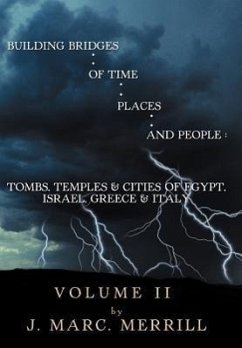
Building Bridges of Time, Places, and People
Volume II: Tombs, Temples & Cities of Egypt, Israel, Greece & Italy
Versandkostenfrei!
Versandfertig in über 4 Wochen
30,99 €
inkl. MwSt.

PAYBACK Punkte
15 °P sammeln!
From Chapter 5: "By a quirk of fate," says Darcie Conner Johnston, the eruption [of Mt. Vesuvius in 79 AD] caught Pompeii at a time of great spiritual change. As a gateway south and east to Greece and Egypt and the Eurasian landmass beyond, the city was heir to a panoply of faiths. A host of foreign gods had begun to usurp the positions of the venerable Olympian deities and the imperial Roman pantheon. Christians were likely to have been here as well, though the evidence of their presence is sketchy. (Page 71 of Pompeii: The Vanished City) Besides the evidence that has already been presented m...
From Chapter 5: "By a quirk of fate," says Darcie Conner Johnston, the eruption [of Mt. Vesuvius in 79 AD] caught Pompeii at a time of great spiritual change. As a gateway south and east to Greece and Egypt and the Eurasian landmass beyond, the city was heir to a panoply of faiths. A host of foreign gods had begun to usurp the positions of the venerable Olympian deities and the imperial Roman pantheon. Christians were likely to have been here as well, though the evidence of their presence is sketchy. (Page 71 of Pompeii: The Vanished City) Besides the evidence that has already been presented more remains to demonstrate that once again the accepted historical point of view is incorrect. For example.... This second volume of Building Bridges of Time, Places and People presents the overwhelming evidence that some of the most prominent leaders of the New Testament Church left the lands of Judea and Galilee when war between Rome and the Jews seemed certain, and they settled in Pompeii and Herculaneum. These leaders included Simon Peter, Paul, Luke, and John Mark, the author of The Gospel of Mark. They were accompanied by converts such as Cornelius the centurion, who was the first Gentile to be baptized, and by the mother of Christ. This volume also investigates the town of Sepphoris in Galilee and makes a compelling case for the claim that the Messiah of the New Testament grew up there rather than in Nazareth, his identity hidden until he began his ministry at the age of 30.


